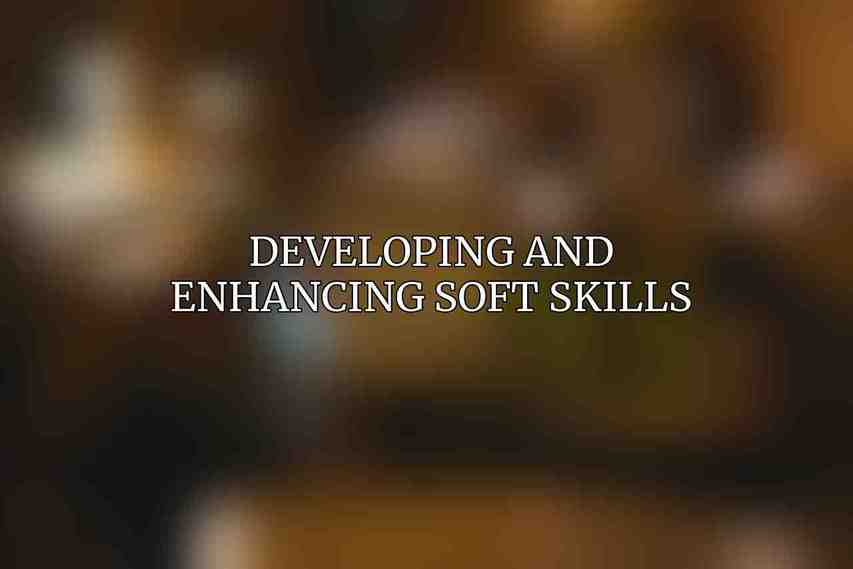Soft skills are becoming increasingly recognized as essential components for career success in the modern professional world. While technical skills and knowledge are vital, it is often the soft skills that set individuals apart in their career paths. From effective communication to adaptability and emotional intelligence, these skills play a significant role in shaping one’s professional journey. This article delves into the importance of soft skills, their impact on career outcomes, key soft skills for success, strategies for development, real-world case studies, and the significance of continuous improvement in empowering individuals for career advancement.
Importance of Soft Skills in Career Success
Soft skills have become indispensable assets that can determine an individual’s success. these skills encompass a broad range of attributes that enable people to interact effectively with others, navigate challenges, and contribute positively to their work environments. Soft skills can include communication, teamwork, problem-solving, adaptability, leadership, emotional intelligence, and more. They are not job-specific but are transferable across various roles and industries, making them valuable assets that professionals can carry throughout their careers.
Definition and Types of Soft Skills
Soft skills are commonly defined as personal attributes that enable individuals to interact effectively with others. These skills are often intangible and relate to how individuals approach their work and interact with colleagues, clients, and stakeholders. There are several key types of soft skills that are crucial for career success, including:
– Communication skills
– Teamwork and collaboration abilities
– Emotional intelligence
– Problem-solving capabilities
– Adaptability and resilience
– Leadership and influence qualities
Soft skills are not only valuable in individual contributions but also in fostering a positive and productive work environment where collaboration thrives, and conflicts are effectively managed.
Impact of Soft Skills on Career Outcomes
Soft skills play a pivotal role in shaping career outcomes by enhancing various aspects of professional performance. These skills contribute to: Dive deeper into Maximizing Skill Acquisition Through Online Learning Platforms
– Enhancing Teamwork and Collaboration: Effective communication and interpersonal skills help build strong working relationships and foster a collaborative environment.
– Building Strong Interpersonal Relationships: Emotional intelligence plays a significant role in understanding and connecting with others, strengthening professional relationships.
– Improving Communication and Problem-Solving: Strong communication skills aid in conveying ideas clearly, while problem-solving abilities enable individuals to address challenges effectively.
– Fostering Adaptability and Resilience: Being adaptable and resilient in the face of change or obstacles is essential for navigating the dynamic nature of work environments. Dive deeper into Essential Modern Workplace Skills to Accelerate Your Career
– Demonstrating Leadership and Influence: Leadership qualities, such as decision-making and influencing skills, are critical for driving projects forward and inspiring others.
Soft skills serve as the foundation for professional success, enabling individuals to navigate challenges, collaborate effectively, and showcase their capabilities in various roles and responsibilities.
Key Soft Skills for Career Success

Teamwork
Teamwork is a fundamental soft skill that involves collaboration and cooperation with others. Key components of teamwork include:1. Active Listening: Listening attentively to others’ perspectives and ideas.2. Conflict Resolution: Addressing and resolving conflicts that arise within teams.3. Consensus-Building: Working towards agreement and alignment among team members on decisions and objectives.
Communication
Effective communication is crucial for conveying information, ideas, and messages clearly and concisely. Components of communication skills include:1. Verbal and Written Communication: Articulating thoughts effectively in both spoken and written forms.2. Presentation Skills: Delivering engaging and persuasive presentations to convey information.3. Interpersonal Skills: Building connections and rapport with others through effective communication.
Emotional Intelligence
Emotional intelligence refers to the ability to understand and manage one’s emotions and relate effectively to others. Components of emotional intelligence include:1. Self-Awareness: Recognizing and understanding one’s emotions and reactions.2. Empathy and Compassion: Showing understanding and sensitivity towards others’ emotions and experiences.3. Regulation and Control of Emotions: Managing emotions in a constructive and adaptive manner.
Problem-Solving
Problem-solving skills are essential for identifying, analyzing, and resolving complex issues efficiently. Components of problem-solving skills include:1. Analytical Thinking: Evaluating situations logically and systematically to arrive at solutions.2. Critical Thinking: Applying rational and objective analysis to assess problems and develop solutions.3. Decision-Making: Making sound and effective decisions based on available information and considerations.
Adaptability
Adaptability involves being open to change, learning continuously, and remaining flexible in dynamic work environments. Components of adaptability skills include:1. Openness to Change: Embracing and adjusting to new situations and challenges.2. Continuous Learning: Seeking opportunities for growth and development to enhance skills and knowledge.3. Flexibility and Resilience: Adapting to unexpected circumstances and bouncing back from setbacks with resilience.
Developing and Enhancing Soft Skills

Enhancing soft skills requires deliberate effort and a commitment to self-improvement. Strategies for developing and enhancing soft skills include:
– Self-Assessment and Identification of Areas for Improvement: Reflecting on strengths and weaknesses to identify areas that require development.
– Training and Workshops: Participating in training programs and workshops to enhance specific soft skills.
– Coaching and Mentoring: Seeking guidance and feedback from mentors or coaches to improve soft skills.
– Hands-On Experience and Projects: Engaging in projects and activities that allow for the application and refinement of soft skills.
– Networking and Collaboration: Building relationships and collaborating with others to hone communication, teamwork, and interpersonal skills.
Continuous investment in soft skills development is essential for professional growth and success, enabling individuals to adapt to changing demands and excel in their careers.
Case Studies and Examples
Real-world examples of individuals and organizations that have leveraged soft skills to achieve success provide valuable insights into the impact of these attributes on career outcomes. Success stories highlight how individuals with strong communication, leadership, and problem-solving skills have been able to navigate challenges, lead teams effectively, and achieve professional milestones. Moreover, organizations that prioritize soft skills training and development often experience positive outcomes in terms of employee engagement, collaboration, and overall performance.
Soft skills are the cornerstone of career success, playing a pivotal role in shaping individual performance, relationships, and opportunities for growth. By cultivating key soft skills such as communication, teamwork, emotional intelligence, problem-solving, and adaptability, professionals can enhance their effectiveness, influence, and impact in the workplace. Continuous development and improvement of soft skills are essential for navigating the complexities of modern work environments and empowering individuals to advance their careers with confidence and resilience. In an ever-evolving professional world, the power of soft skills remains a driving force for personal and professional success.
Frequently Asked Questions
1. How do soft skills differ from technical skills?
Soft skills refer to non-technical skills such as communication, teamwork, and problem-solving, while technical skills are job-specific abilities like programming or engineering.
2. Why are soft skills important in career development?
Soft skills are essential for building strong relationships, effective communication, and problem-solving, all of which are crucial for career success and progression.
3. How can I improve my soft skills?
You can improve your soft skills through practice, training, seeking feedback, and self-reflection. Engaging in activities such as networking, public speaking, and leadership can also help enhance your soft skills.
4. Can soft skills be learned or are they innate?
While some individuals may naturally possess certain soft skills, most can be learned and developed through consistent effort, practice, and self-awareness.
5. What are some examples of soft skills that employers value?
Employers value soft skills such as communication, problem-solving, adaptability, teamwork, leadership, emotional intelligence, and time management. These skills are often seen as indicators of a candidate’s potential for success in the workplace.

